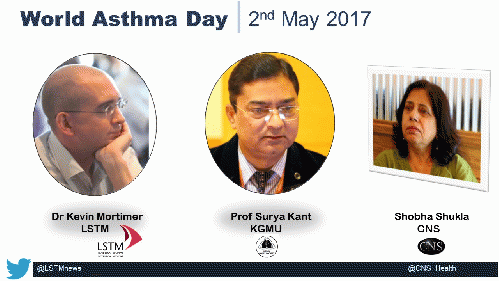
(L to R) Dr Kevin Mortimer LSTM, Dr Surya Kant KGMU, Shobha Shukla CNS
(Image by CNS (Citizen News Service)) Details DMCA
Watch webinar recording: http://bit.ly/asthma17-recording
Listen or download podcast: http://bit.ly/asthma17-podcast
Our governments have committed to reduce premature deaths due to non-communicable diseases (including asthma) by one-third by 2030 (Sustainable Development Goals or SDGs). The National Health Policy 2017 of India also promises to "reduce premature mortality from cardiovascular diseases, cancer, diabetes or chronic respiratory diseases by 25% by 2025".
Asthma is the commonest respiratory non-communicable disease but still so neglected with over 30 million (3 crores) people with asthma in India, and 300 million globally (1 in 20). Although asthma cannot be cured, it can be treated and controlled. Good asthma control means no, or very minimal, symptoms, and a low risk of asthma attacks or other poor outcomes. More importantly, good asthma control means, a person can live life normally!
Noted lung health expert Dr Kevin Mortimer of Respiratory Medicine Department of Liverpool School of Tropical Medicine rightly said that despite alarming disease burden of asthma, we do not even have a definitive diagnostics.
In Canada, researchers found that one-third of adults treated for asthma did not actually had this airway disorder. Earlier a news reported that half a million children with asthma in the UK did not had the disease. A NHS watchdog agency had earlier warned that a million people with asthma in the UK may not have the condition.
There is no doubt that for accurate definitive diagnosis of asthma, research has to be boosted so that an easy-to-use, accessible and affordable, and highly sensitive and specific diagnostic test, that can be used in real life urban-rural situations in low- and middle-income countries, can become a reality.
"Every wheezing is not asthma. Sometimes, symptoms of asthma mimic those of other chronic respiratory diseases" warned Professor (Dr) Surya Kant Tripathi, Head of Respiratory Medicine at King George's Medical University (KGMU) and President of Indian Chest Society. While other evidence-based diagnostic algorithms should be used as per guidelines, research for better definitive diagnostics for asthma is indeed becoming a compelling priority.
Prof Surya Kant pointed out that poor management of asthma often forces patients to end up with emergency hospitalization which could have been avoided if proper care and basic effective treatment was accessible to all those in need. The Government of India's National List of Essential Medicines (NLEM) includes medicines used in inhalers but availability of these is grossly inadequate forcing an alarming number of people with asthma to end up being hospitalized, and even, losing their life to an avoidable cause had effective treatment been within their reach.
(Note: You can view every article as one long page if you sign up as an Advocate Member, or higher).





